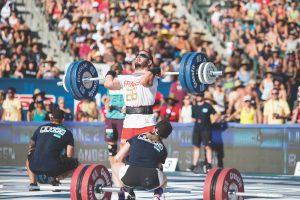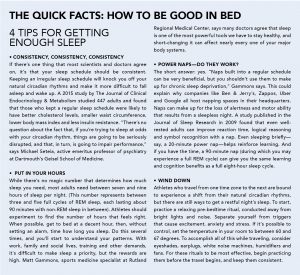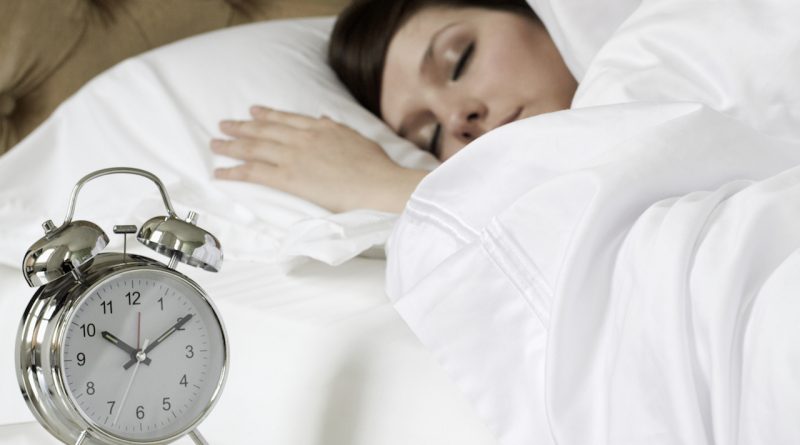Sleep: The Second Most Powerful Fitness Tool
Getting on a healthy sleep schedule could mark the difference between a good athlete and a great one.
There is a growing trend among today’s top athletes—the ones you look at and ask, where did she come from? How does he keep landing on the podium? At the end of the season, they’re still going when everyone else is burnt out. Turns out, these athletes get more of one thing than the average person, and it’s pretty simple.
Sleep.
Sure, there are plenty of other factors. Mikaela Shiffrin, the reigning champion of slalom, is known to train longer hours and push herself harder than most other ski racers. And Mat Fraser, three-time CrossFit Games champion who continues to widen the gap between himself and all other CrossFit competitors, has a rigorous training regimen, a balanced diet and pre- and post-workout rituals. LeBron James, known for getting 10 to 12 hours of sleep every night, goes to Versaclimber, spin and pilates classes in the off-season to stay in shape.
But when you get down to it, the most successful athletes are the ones that commit themselves to a healthy, well-rounded lifestyle. They literally eat, breathe—and sleep—their sport.
“Sleep is the number one recovery technique for body and mind,” says Mike Day, Shiffrin’s coach. Shiffrin has told the media: “I try to go to bed somewhere between 8:30 and 9 at night. Sleep is huge for me. It’s my best, main and favorite form of recovery…I need eight and a half to nine hours of sleep to feel my best.”
After placing second twice in the CrossFit Games, Fraser was ready to do anything to win gold. The main thing he changed? “The regular sleep schedule—not staying up until 2 a.m. watching Netflix,” he told Vermont Sports last December. Leading up to the 2016 Games, Fraser went to bed and woke up at the same time every day, whether he was training or on vacation. And the results paid off: Fraser won the Games by 200 points—the largest margin in history. In 2017, he won by 216 points,

beating his own record.
So can sleep really make the difference between a good athlete and an all-time champ?
“I certainly think it makes a difference in separating the great from the really good,” says Matt Gammons, a sports medicine specialist at Rutland Regional Medical Center and a consulting physician at Green Mountain Valley School in Waitsfield. “The margin at elite levels is such a fine thing. And if you look at sleep through adolescence, sleep is an opportunity for players who have potential to fulfill that potential. Take Mikaela. This season, sleep could make the difference between first place and second place in a GS race for her.” And for the kids Gammons sees at GMVS, not getting enough sleep could derail the opportunity they have to be the next Mikaela.
Recently, scientists have realized exactly how powerful sleep can be for our health—powerful enough that, in early October, 2017, researchers Jeffrey C. Hall, Michael Rosbash and Michael W. Young were awarded the Nobel Prize in Physiology or Medicine for their work on circadian rhythms, which regulate sleep. Their discoveries explain, on a molecular level, how plants, animals and humans adapt their biological rhythm so that it’s synchronized with Earth’s revolutions. More than ever, it is clear that our bodily functions are naturally aligned with the patterns of day and night—and fighting these patterns could create consequences for our health.
But for athletes—those of us who use our bodies rigorously on a daily basis—getting sleep is extra-important, and it isn’t always easy. There are a lot of unanswered questions about sleep, but scientists are beginning to nail down answers about the amount and quality of sleep that an athlete needs to perform at his or her best.
What Is Sleep?
This seems like an obvious question. Sleep is what you do at the end of the day, when you close your eyes and dream about the gold medals or the significant other or the monsters under the bed. But in reality, scientists are still fuzzy about sleep’s exact purpose—why and how we do it, and what exactly it does for our bodies.
The conclusions they have drawn include the following: Sleep reenergizes our bodies on a cellular level. An influx of cerebrospinal fluid washes into the brain during sleep, clearing away harmful waste proteins like a dishwasher—which explains why scientists recently linked chronic sleep deprivation to Alzheimer’s and dementia (both have been connected to a building up of plaque in the brain). Sleep supports emotional drive and promotes motivation, the ability to learn and remember, and even controls appetite and libido.
Sleep starts, ironically, when certain regions of the brain become active. With a natural dose of melatonin, the hypothalamus and the parafacial zone in the brain prompt slow-wave sleep (SWS) and when the cells in those regions turn on, our consciousness shuts off.
After that, we enter rapid-eye-movement (REM) sleep. The first cycle usually occurs 70 to 90 minutes after we fall asleep, and the average sleeper experiences between three and five REM cycles per night. An entire cycle lasts between 90 and 110 minutes. During those cycles, our bodies regulate hormones that control our hunger (ghrelin), blood-glucose level (insulin) and the development of our muscles and tissues (growth hormones).
So it might not be surprising that athletes—people who physically exert themselves, rely on precise movements and learn new skills on a daily basis—need to pay particularly close attention to their sleep habits.
Sleep provides several things that are important to athleticism, according to Michael Seteia, active emeritus professor of psychiatry at Dartmouth’s Geisel School of Medicine. “It’s essential to providing a positive emotional state and high motivation,” he says.
Think about your training: it’s much more likely that we’ll be motivated to do that last rep, take that last run or push ourselves just a little bit harder, if we’ve had a full night’s sleep.
“Then there’s the somatic aspect,” Seteia says, “which is metabolism and glycogen synthesis and storage, and being able to efficiently fuel muscle cells that are required in intense athletic competition. In the past, we didn’t pay a whole lot of attention to the role of sleep in metabolism. Now, of course, we understand that sleep plays a very critical role in metabolism, and with insufficiencies, metabolic function is less efficient than it should be or could be. That, in turn, will have an obvious effect on athletic performance, especially for endurance athletes.”
The last thing sleep does for us, he says, is improve cognition; it helps us with procedural learning, and it sharpens our hand-eye coordination and muscle memory.
In 2014, Cheri D. Mah, a researcher at Stanford, experimented with the idea that sleep improves cognition. Her subjects were Standford’s men’s basketball team. Eleven players wore wristbands that tracked their sleeping patterns. She found that, on average, the athletes slept 6.5 hours per night. For two weeks, they kept their regular sleep schedule while Mah monitored their performance on a 282-foot sprint drill, free-throw drills and three-point shooting. Then, the athletes were told to do everything they could to increase their sleep, still tracked by their wristbands. The team average moved from 6.5 to nearly 8.5 hours of sleep per night.
The players’ performance improved significantly. Free-throw shooting improved by 11.4 percent, three-point shooting shot up by 13.7 percent, and their 282-foot sprints were 0.7 seconds faster, on average. That’s the kind of improvement that might come with performance-enhancing drugs or decades of training.
The Ideal Sleep Schedule
So what kind of sleep schedule should an athlete have? The short answer: it varies. The amount of sleep an individual needs depends on age, amount of physical activity, stress level, diet, personal preference—the list goes on.
While it’s impossible to propose a sleep schedule that works for everyone, the American Academy of Sleep Medicine suggests that adults get a minimum of seven hours per night, and as many as nine hours. Adolescents, who rely on the growth hormone to regulate puberty, along with the growth of muscles and tissues, need more—about nine hours per night.
Though athletes exert themselves more than the average sleeper, there is no evidence to suggest that athletes need more sleep than anyone else. Some people may naturally sleep longer, and some studies indicate that athletes are more likely to achieve a better, deeper quality of sleep, but LeBron James’ 12 nightly hours aren’t necessarily the key to athletic success.
“It’d be tempting to say, ‘Gee, if everybody gets 10 to 12 hours of sleep, they’re going to be like LeBron James, and obviously that’s not true,” Seteia says. “The fact is that LeBron James could be, intrinsically, a longer sleeper, and not everybody would be even capable of getting 10 to 12 hours of sleep.”
The key to a successful sleep schedule is the same for athletes as for anyone else: making it regular. “An ideal sleep schedule is one that’s consistent,” says Gammons. “So if you go to bed around the same time and get up around the same time, these things, over time, tend to build better sleep patterns and make you more tolerant to interruptions in terms of being able to get yourself to sleep.”
It’s Easy, Right?
While sleeping might sound like the simple part of the eat-train-sleep-repeat cycle—less complicated than developing a balanced diet, and surely less strenuous than running drills—it’s surprisingly difficult to get enough of it.
For elite athletes, schedules shift both seasonally and daily, and getting a good, steady amount of sleep might be considered the hardest component of the sports lifestyle to achieve. Again, take  Shiffrin: in the summer, she travels to New Zealand and Chile. In the fall, she’s off to Europe, and then the World Cup touring begins. Between jet lag and her training schedule, she has to work to make sleep a priority. The rest of us have it easier, though we still have to balance sleep with work, social lives, family time and some amount of training.
Shiffrin: in the summer, she travels to New Zealand and Chile. In the fall, she’s off to Europe, and then the World Cup touring begins. Between jet lag and her training schedule, she has to work to make sleep a priority. The rest of us have it easier, though we still have to balance sleep with work, social lives, family time and some amount of training.
But that doesn’t mean that all hope is lost.
“Consistency is important if it’s possible,” Gammons says, “but if you can’t have an exact pattern, you can have consistency in your rituals and planning in terms of how you sleep—turning off stimulation a half hour to 45 minutes before you want to go to sleep, not taking caffeine late in the day, those kinds of common-sense things.”
A few habits will increase your chances of getting deep, restful sleep. If possible, avoid exercising in the hours before you fall asleep. Before bed, do something relaxing—take a bath, put on some calming music—forget your stressors, if you can. And by all means, avoid what Seteia calls “the kiss of death:”
the hours before you fall asleep. Before bed, do something relaxing—take a bath, put on some calming music—forget your stressors, if you can. And by all means, avoid what Seteia calls “the kiss of death:”
“If people are really having trouble sleeping, they shouldn’t remain in bed awake for extended periods,” he says. “It starts to potentially result in increasing insomnia problems, because you begin to associate the bed with wakefulness and frustration. That’s not a good thing.”
For those who travel regularly, or who can’t seem to nail down a regular schedule, Gammons says it’s possible to make up for what he calls “acute sleep debt,” which accumulates over time, but it’s much easier to make up for a short-term lack of sleep.
“If you’re traveling for a couple of days,” he says, “it’s relatively easy to get back on track with a few nights of good sleep. What seems to be harder is the athlete who’s chronically sleep deprived. Just taking a nap isn’t going to make up for that. It really requires a lifestyle change that basically, over a couple of weeks, will start to reset the system.”
But for adults who exercise regularly, avoiding chronic sleep deprivation and keeping to a consistently generous sleep schedule could be the key to a powerfully healthy lifestyle.
“Getting on a regular sleep schedule is nice from an athletic standpoint, but just from a life standpoint, sleep patterning is probably the second-most important thing we can do,” Gammons said. “You’d be surprised at how much exercise and sleeping well can moderate other things. If you were going to do three things for your health, exercising moderately most days of the week, not smoking, and getting good sleep—those are probably the most powerful things we have.”




